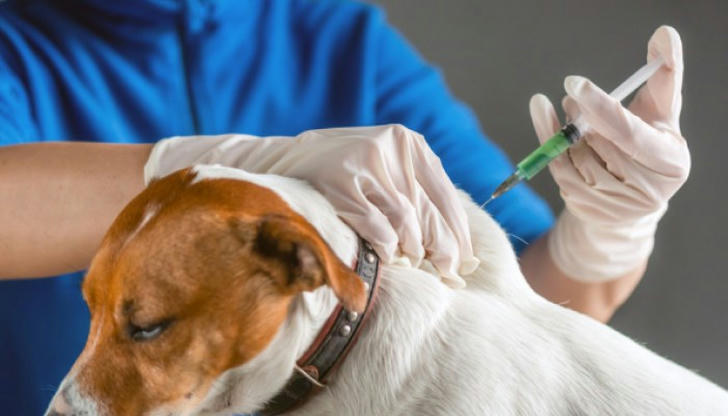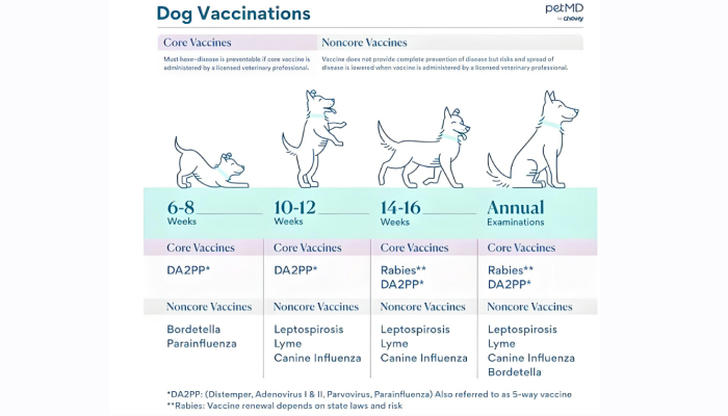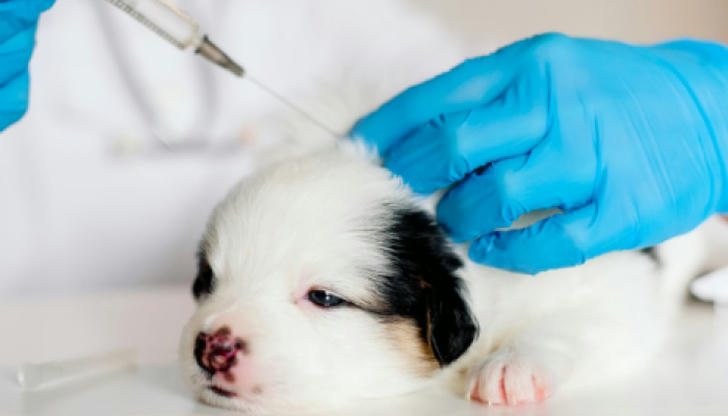Save Your Dog's Life with These Crucial Vaccines: Here's What You Need to Know

Vaccinating your dog is crucial in safeguarding them from serious and potentially life-threatening diseases. The science behind vaccinations is based on immunization, where your dog's immune system is stimulated to recognize and fight off pathogens (like viruses or bacteria) without causing illness. Vaccines are made using either inactivated viruses, bacteria, or just parts of them, allowing the body to build immunity. When exposed to the actual pathogen later, the immune system is already prepared to combat it effectively.
Canine vaccines play a vital role in reducing the spread of contagious diseases and preventing unnecessary suffering, often saving lives. By ensuring your dog receives the necessary vaccinations, you're not only protecting them but also contributing to public health and the well-being of other pets.
What Are the Common Dog Vaccinations?

There are several core and non-core vaccines that every dog should have, depending on their lifestyle and the risks they face. Here's a breakdown of some of the most common vaccinations:
DHLPP (Distemper, Hepatitis, Leptospirosis, Parvovirus, and Parainfluenza)
This combination vaccine is typically given as part of a dog's puppy vaccination series and includes five important protections:
- Distemper: A severe viral disease affecting the respiratory, gastrointestinal, and nervous systems. It is highly contagious and can be fatal.
- Hepatitis (Adenovirus): A viral infection that affects the liver and can cause severe illness or death.
- Leptospirosis: A bacterial infection that can cause liver and kidney damage and is zoonotic, meaning it can also be transmitted to humans.
- Parvovirus: A highly contagious virus that causes severe vomiting, diarrhea, and dehydration. It can be fatal, particularly in puppies.
- Parainfluenza: A virus that contributes to kennel cough, a contagious respiratory disease.
Rabies
Rabies is a viral infection that attacks the brain and is almost always fatal. It's also zoonotic, meaning it can be transmitted to humans. This vaccine is legally required in many areas due to its public health importance.
Bordetella (Kennel Cough)
Bordetella bronchiseptica is a bacterium that causes a highly contagious respiratory infection often referred to as kennel cough. This is especially important for dogs that interact with other dogs at places like boarding kennels, dog parks, or grooming salons.
Canine Influenza
This is a relatively new vaccine but is important for dogs exposed to large groups of other dogs, as canine flu can spread quickly in such environments. Symptoms are similar to those of human flu, including coughing, fever, and nasal discharge.
Lyme Disease
Caused by the Borrelia burgdorferi bacteria, Lyme disease is transmitted through tick bites. If your dog spends time outdoors, particularly in tick-infested areas, this vaccine is essential to protect against the disease.
Adult Dog Vaccine Schedule

The vaccination schedule for adult dogs varies depending on their age, health status, and lifestyle. Typically, dogs start receiving vaccines at around 6 to 8 weeks of age, with booster shots every 3 to 4 weeks until they are about 16 weeks old. Afterward, adults need booster shots to maintain immunity.
For adult dogs, here's a general guideline:
- Rabies: This vaccine is usually given once a year or every three years, depending on local laws and the vaccine used.
- DHLPP (Distemper, Hepatitis, Leptospirosis, Parvovirus, and Parainfluenza): These vaccines are often given as a combination shot. Boosters are required every 1 to 3 years, based on the vaccine and the dog's lifestyle.
- Bordetella: This vaccine is usually given every 6 to 12 months, depending on the dog's risk of exposure.
- Canine Influenza: This vaccine is typically administered yearly if your dog is at risk.
- Lyme Disease: If your dog is at risk for Lyme disease, this vaccine is usually given annually.
Your veterinarian will tailor the schedule to your dog's specific needs, considering their activity level, environment, and exposure to other animals.
What Diseases Do Dog Vaccines Prevent?

Dog vaccines are crucial in preventing various diseases that can lead to severe illness or death. Some of the most serious diseases that vaccines protect against include:
- Rabies: A fatal virus that affects the nervous system, rabies can be transmitted through bites from infected animals and can lead to death in both dogs and humans.
- Distemper: This virus attacks multiple body systems, including the respiratory, gastrointestinal, and nervous systems. It can cause severe illness, seizures, and even death.
- Parvovirus: Known for causing severe gastrointestinal illness, parvovirus can lead to dehydration, shock, and death, especially in puppies.
- Leptospirosis: A bacterial infection that attacks the liver and kidneys. It can be transmitted through contact with contaminated water or soil and can also affect humans.
- Bordetella: This causes kennel cough, a highly contagious disease that leads to coughing and respiratory distress, often requiring antibiotics or other treatments.
- Canine Influenza: A highly contagious flu virus that affects the respiratory system, causing symptoms like coughing, fever, and nasal discharge.
Without vaccination, these diseases can spread rapidly, leading to widespread outbreaks and significant suffering for dogs.
Which Dog Vaccines Does My Pet Need?

The vaccines your dog needs depend on several factors, such as their age, health status, lifestyle, and environment. All dogs should receive core vaccinations, such as rabies, distemper, parvovirus, and adenovirus. However, additional vaccines may be recommended based on your dog's specific needs:
- Active or outdoor dogs: Dogs that spend a lot of time outdoors or in contact with other dogs are at higher risk for diseases like Lyme disease, Bordetella, and canine influenza.
- Puppies: Puppies need a series of vaccinations starting at 6 to 8 weeks, including DHLPP and rabies, with boosters given until they are about 16 weeks old.
- Senior dogs: Older dogs may need fewer vaccines but should still stay up-to-date with core vaccinations to prevent serious diseases.
- Dogs with health issues: If your dog has a compromised immune system or other medical conditions, their vaccination schedule might need to be adjusted to ensure safety.
Consult with your veterinarian to determine the best vaccine plan based on your dog's individual lifestyle and health risks.
Conclusion
Dog vaccinations are a crucial part of responsible pet ownership. They help prevent deadly diseases, protect your dog's health, and reduce the spread of infectious diseases within the community. By staying on top of your dog's vaccination schedule and working with your veterinarian to determine the best plan for your dog's lifestyle, you can ensure they live a long, healthy life free from preventable diseases.
